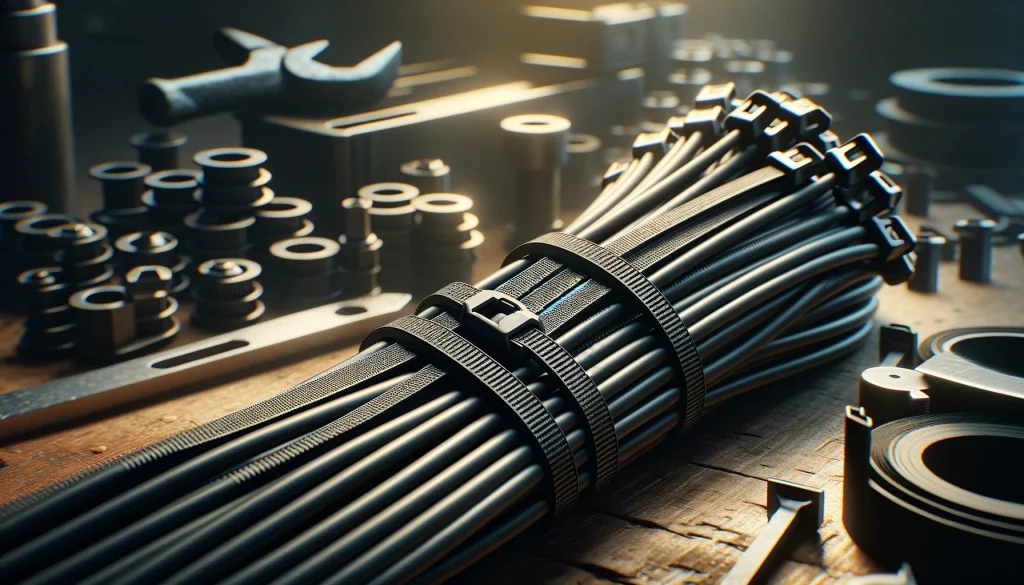Nylon cable ties are versatile fasteners that you can use in many industries for bundling and securing wires and cables. Choosing high-quality nylon cable ties is crucial for safety, reliability and longevity of installations. This article will explain how to identify and select top-notch nylon zip ties.
Types of Nylon Used in Cable Ties
Nylon 6/6 is the most common material, offering excellent strength, durability and resistance to heat and chemicals. Nylon 6 has good impact resistance and processability but lower strength and heat resistance than 6/6. UV-resistant and heat-stabilized nylon formulations are available for demanding outdoor and high-temp applications.
Physical Characteristics of Quality Nylon Ties
Appearance should be uniform in color with a glossy surface free of flaws, bubbles or impurities. Teeth and locking mechanism must be precise, neat and sturdy, not deforming when scratched. Ties should be flexible yet strong when stretched, not brittle with a clean break.
Tensile Strength Ratings
Tensile strength measures the maximum load a cable tie can bear before breaking. Ties are rated in pounds or kilograms, typically ranging from 18 lbs for miniature ties to 175 lbs for heavy-duty. Always select a tie with a tensile strength exceeding the forces it will encounter in the application.
Standardized Testing
Legitimate manufacturers test cable ties to stringent quality standards like UL, RoHS and MIL-SPEC. Tensile strength and moisture content are evaluated using specialized equipment to verify ratings. Consistent testing conditions and procedures are critical for accurate results.
Comparing Nylon and Polypropylene Ties

Nylon and polypropylene are two common materials used in manufacturing cable ties, each offering distinct properties and advantages. This article will explore the characteristics, applications, and differences between nylon and polypropylene ties to help you choose the most suitable option for your needs.
Nylon Cable Ties
Properties and Advantages
Nylon, particularly nylon 6/6, is the most widely used material for cable ties due to its excellent balance of strength, flexibility, and durability. These cable ties offer:
- High tensile strength
- Good heat resistance up to 185°F (85°C)
- Resistance to fuels, lubricants, and most chemicals
- Flexibility and abrasion resistance
Nylon 6/6 can be heat-stabilized for continuous exposure to temperatures up to 250°F (121°C) and UV-stabilized for outdoor applications.
Applications
Nylon's versatility makes it ideal for general-purpose cable management in various industries, including electrical, automotive, aerospace, and general manufacturing.
Polypropylene Cable Ties
Properties and Advantages
Polypropylene cable ties provide superior chemical resistance compared to nylon and are a suitable alternative for harsh environments. They offer:
- Resistance to acids, alcohols, and various salts
- Flexibility and UV resistance
- Buoyancy in liquids
- Cost-effectiveness
Applications
In applications prioritizing chemical resistance over high tensile strength, industries commonly use polypropylene ties. These include the chemical process industry and related harsh environments.
Comparison and Selection
While nylon cable ties provide superior strength, heat resistance, and all-around performance, polypropylene ties offer enhanced chemical resistance and flexibility. The choice between nylon and polypropylene depends on the specific application, environmental factors, and required material properties.
Both materials are available in various lengths, widths, and colors to accommodate different bundling requirements. When selecting the appropriate cable tie, consider factors such as tensile strength, temperature range, chemical exposure, and UV resistance to ensure optimal functionality, reliability, and longevity in your cable management applications.
Conclusion
Evaluating the quality of nylon cable ties involves examining the materials, construction, ratings and testing. Premium ties deliver superior performance and value compared to cheap, substandard versions prone to failure. By following this guide, you can confidently choose high-caliber nylon zip ties for your critical application.

